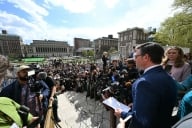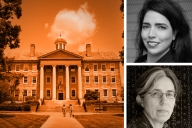You have /5 articles left.
Sign up for a free account or log in.
Some faculty members at the University of North Carolina at Chapel Hill are raising concerns because the flagship’s newly named interim chancellor was previously involved in what they see as a case of academic censorship sparked by outside considerations.
Such worries resonate strongly at Chapel Hill in light of bruising battles between the systemwide UNC Board of Governors and campus executives over a range of issues -- such as whether the Silent Sam Confederate monument should be removed from the flagship’s campus and whether a center for civil rights should be prevented from engaging in litigation. Both the system president and Chapel Hill's chancellor have departed amid these struggles, opening a leadership vacuum that faculty advocates say must be filled by interim leaders who can be trusted to defend the traditions of academic freedom and shared governance.
On Wednesday, the University of North Carolina System named Kevin M. Guskiewicz interim chancellor at Chapel Hill. The appointment was being closely watched after the system Board of Governors ushered former chancellor Carol Folt out the door soon after she decided last month to remove from campus the remaining pieces of the felled Silent Sam Confederate monument.
Guskiewicz, an expert on sports-related concussions, has been dean of the College of Arts and Sciences at Chapel Hill since January 2016. In announcing his appointment, the system noted that he had been in charge of Chapel Hill’s largest academic enterprise and that his research work has been credited with influencing concussion practices in the National Collegiate Athletic Association and National Football League.
“As I’ve said, UNC-Chapel Hill needs its interim chancellor to be a leader of stature -- someone who knows the institution, knows the state, and is ready to drive the university forward,” said the system’s interim president, Bill Roper, in a statement. “Kevin is that leader.”
But Jay Smith, a professor in the history department at Chapel Hill, soon called Guskiewicz’s record into question. The interim chancellor was involved in a disagreement over whether Smith could teach a course in the fall of 2017 titled Big-Time College Sports and the Rights of Athletes, 1956 to the Present.
Smith had taught the course over the previous fall and summer after co-writing a 2015 book, Cheated, documenting an extensive scandal at UNC over “paper” classes that never met and benefited many athletes. Students gave Smith's class mostly positive reviews, The News & Observer reported.
Although Smith taught the course last spring and is teaching it now -- it has more than 160 students, he says -- he was not permitted to teach it in the fall of 2017. That prompted him to file a grievance alleging that the decision not to offer the course violated his academic freedom and didn’t follow history department procedures. Guskiewicz was one of four leaders he alleged improperly interfered with the decision.
A Faculty Grievance Committee report from October 2017 found that the course in question had received “an extraordinary amount of attention” from Guskiewicz and a senior associate dean, that a department chair interpreted that attention as pressure to keep the course off of the regular academic schedule and that the pressure was “inconsistent with the university’s commitment to academic freedom” and a department tradition of deferring to faculty for course selection choices.
The university’s provost declined to accept those conclusions due to what the university called “multiple factual and procedural errors.” The grievance was deemed unnecessary because Smith ultimately received permission to teach the course in question in the spring 2018 semester.
In the university’s telling, no pressure was placed on anyone over the class’s scheduling. It maintains the issue at hand was Guskiewicz’s responsibility as dean to review course offerings and meet curricular needs in light of budget constraints. The history department needed Smith to teach an honors course students had signed up for, it said.
Smith retorted that the conflict played out in an “atmosphere of veiled threats” and that he had offered to meet the requirements for an honors course by teaching the class on college sports as an honors program.
“All who care about UNC-Chapel Hill, and who worry about the state of public higher education in North Carolina, need to ask some questions: Why would the leaders of UNC engage in such naked duplicity, and display such shoddy reasoning, simply to avoid accepting the common-sense recommendations of a faculty grievance committee?” he wrote in an op-ed published by The News & Observer in May. “Why does academic freedom scare them so?”
The case raises questions about how Guskiewicz will act as interim president when outside pressures bear down, Smith said in a telephone interview Thursday.
“My course, in the grand scheme of things, should not have been very controversial,” he said. “It should not have drawn that much attention. We’re a big-time college sports institution. Of course such a course should be taught here. If he could not stand up to boosters and sports fans, what is he going to do when legislators are breathing down his neck, or when the Board of Governors gets really testy?”
Smith and some other faculty critics also worry Guskiewicz is too closely associated with athletics at a time when Chapel Hill is coming off of an embarrassing scandal over no-show classes. The NCAA decided not to punish UNC for the classes in 2017, reasoning that it couldn’t conclude the courses in question were designed solely to benefit athletes.
That spared the university and its cash-cow athletic programs from sanctions, but it didn’t restore the faith of faculty members. Now, they are uneasy that the university has an interim president whose concussion research is linked so closely to the revenue-generating sport of football.
“It does bother me our interim chancellor is yet another person who has shown in the past a willingness to work with athletics,” Smith said. “Many of us were ashamed by the university’s refusal to acknowledge fault and fraud in its dealings with the NCAA in 2017, and Guskiewicz was part of the leadership team then. So at the very least, he shares some guilt by association with the rest of the team who decided to take that approach.”
The reasoning might strike some as unfair or counterintuitive -- guilt by association can be shaky ground, and research into concussions has arguably helped to imperil the future of football as a sport. But faculty skeptics wonder why the university didn’t avoid the association altogether.
Chapel Hill released a statement from Guskiewicz on academic freedom mirroring the arguments it made last year.
“As a member of the Carolina faculty for 23 years, I take our commitment to upholding academic freedom very seriously, and I value our system of shared governance between faculty and administrators,” his statement said. “Under that shared governance structure, course offerings are a shared decision between the faculty and the leadership, based on the University’s strategic priorities.”
Nonetheless, critics remained worried. Sherryl Kleinman, professor emerita of sociology, wrote in an email that she is disappointed in the choice of Guskiewicz as interim chancellor after the case.
“Anyone in that position should have an impeccable record in standing for academic freedom,” she wrote. “Yet the Faculty Grievance Committee concluded in its report in 2017 that Dean Guskiewicz acted in a manner 'inconsistent with academic freedom' in his attempts to keep the course Big-Time College Sports and the Rights of Athletes, created by history professor Jay Smith, from being taught. As the FGC put it, 'University officials should not interfere in individual course selection decisions made by department officials nor should they pressure department officials [in this case, the chair of the department of history] in favor of or against particular courses. University officials should not state or imply that a department will lose financial resources or otherwise suffer negative consequences if it were to approve a particular course so long as in the aggregate the department is consistently supporting the University's strategic plans.'"
Not all faculty members are opposed to the appointment. Chapel Hill released a quote from Leslie Parise, a professor and chair of its department of biochemistry and biophysics who is UNC-Chapel Hill faculty chair, supporting Guskiewicz.
“I have known Kevin well for many years and I know he will make an excellent leader for the University,” it said. “As a faculty member, Dean of the College, and accomplished researcher, Kevin has shown his ability to work across schools and departments and lead with both compassion and critical thought. I know he has the very best interests of our students, faculty and staff in mind and his energy and focus will serve us well.”
The system president, Roper, consulted with many stakeholders -- alumni, students, faculty and staff -- before appointing Guskiewicz, said a spokesman, who termed reaction since the appointment “overwhelmingly positive.”
It should be noted that Guskiewicz is stepping into a difficult position. Folt’s departure was highly controversial. Margaret Spellings left the system presidency in January after less than three years amid long-simmering governance tensions. Some see a power vacuum at the top and are suspicious of it being filled by outspoken conservatives on the Board of Governors and an athletic department that still needs to win back trust after two decades of no-show classes that benefited many athletes.
It’s unlikely candidates were clamoring for the job in such circumstances.
Guskiewicz, though, has expressed interest in being a candidate to hold the chancellor job permanently. Both the chancellor and system president are “on record” saying the Silent Sam monument should not be on campus, Roper said, addressing at least one major issue.
Smith acknowledges that in many ways Guskiewicz would have looked like an obvious choice under the circumstances. He’s a longtime faculty member who knows the institution and has been a dean at a time when the pool of candidates likely wasn’t deep.
“But those sensible reasons don’t trump the very deep concerns that I have,” Smith said.








